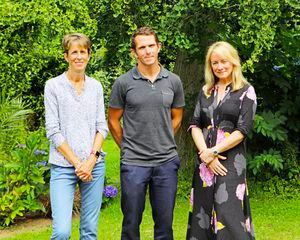Free screening ‘will save people’s lives’
A SCREENING programme has been launched to identify and treat a ‘massively under-diagnosed’ genetic disorder which can lead to heart disease.

It is the first genomic screening programme in the island and is aiming to be one of the most effective in the world.
Queen’s Road Medical Practice and Wessex Familial Hypercholesterolaemia Service are working in partnership to launch the initiative, which will be free.
The aim of screening is to identify and treat people in the Bailiwick with the genetic condition FH, which results in high levels of cholesterol that can lead to cardiovascular disease, the leading cause of preventable death in the developed world.
If the condition is identified it can be treated with medication and the likelihood of developing the disease is reduced.
Dr Mat Dorrian, a Queen’s Road GP who will lead the programme in Guernsey with support from WFHS, said that though there are some screening programmes in the UK, this was the first in Guernsey.
‘This is really exciting to have this available now in the island,’ he said.
‘The condition is massively under-diagnosed, with only 10% of cases identified in Guernsey and 7% in the UK, yet the epidemiology in the island is one in 50.
‘But we think this programme will enable people to be more aware of it. It’s such a close-knit community here and we hope it will cascade down through families and friends and hopefully we will get to check everyone out.
‘We want to become the most-effective screening programme in the world and we’ll be saving lives in the process.’
The programme, supported by Butterfield, Health & Social Care and the Health Innovation Charitable Trust, aims to identify as many FH gene carriers in the Bailiwick as possible in the next three years through a series of free genetic screening clinics.
Candidates for the clinics can be referred by their GP and specialists, with testing and treatment in the clinic.
Health & Social Care president Heidi Soulsby said the committee was really pleased to see the project move forward.
‘This programme fits in well with our new model of care through partnership of purpose,’ she said.
‘The key principle of this is to prevent and intervene and by focusing on prevention we can deliver not only better health care, but also care that offers better value for money.
‘We’re happy to invest and support this free programme, alongside the other services on offer, such as free cervical smears and the HPV vaccination for boys, so this completely fits in.’
The first genomic screening clinic is due to take place in October.
What is FH?
It is a common life-threatening genetic condition that causes high cholesterol. Untreated, it leads to early heart attacks and heart disease.
People with FH have a high amount of low-density lipoprotein or ‘bad cholesterol’ due to a mutation in one of the genes that controls the way cholesterol is cleared by the body. As a result, cholesterol accumulates in the bloodstream and can build up in the walls of the arteries, atherosclerosis, and can lead to problems such as heart attacks and strokes in young adults and even children.
FH is inherited and passed down through families. When one individual with FH is diagnosed, it is important that all family members are screened.
Treatment should begin early. Although lifestyle and diet are important factors to staying heart healthy, for those with FH, that is not enough.
Source: thefhfoundation.org





